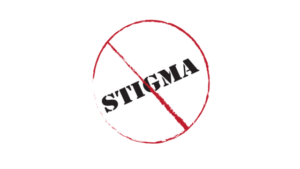
I was seven when I had my first panic attack.
It was a Thursday night; I had just gotten home from a Girl Scouts meeting. I was in the living room with my parents. My dad was sitting in his recliner watching TV, and my Mom and I were at the bar, studying my spelling words.
Everything was going great. I was doing a little happy dance every time I got a word right. I was flying through the spelling list, never missing a word, and then it happened. I got a word wrong.
Tears started streaming down my face. My mom was telling me that it was alright, “It’s just one word, it’s not the end of the world.” And all of a sudden I couldn’t breathe. My parents told me to calm down, that I was going to make myself pass out.
If my reaction sounds extreme, you have probably never experienced a panic attack. Yet I’m not alone. People feel this way every single day and never tell anyone about it.
My parents were telling me to breathe, but what they failed to understand was that I couldn’t. It felt like my world was ending. My throat was growing tight, my chest squeezing itself, and I didn’t think it would ever get better.
Eventually it stopped. The tears dried up, and I could breathe again. The world slowly returned to normal, and I went to bed. This was the first of many panic attacks I would have in the future. My parents used to tell me I was hyperventilating; that I was making a big deal out of nothing.
I didn’t think anything of it then or in the eight years afterwards, although I continued to suffer from panic attacks at unpredictable moments. I didn’t know there was anything to think, until I joined the national chapter of Active Minds, an organization that wants to end the stigma around mental health. Through this my eyes were opened up to a world that was previously closed off.
I learned about anxiety, depression, and other mental health problems. Things started to slowly make sense to me as I discovered this new world. I realized what my parents previously said was me hyperventilating, was me having a panic attack. When I was being “overdramatic,” it was me having anxiety. When the attacks were mild, I would just listen to music and cry until they passed. When the attacks were bad, I would crawl into the shower fully clothed and hope that it would be over soon. I found myself asking, “Why didn’t my parents get me help?”
The answer wasn’t one I was expecting, but it’s a common answer nonetheless. My mom didn’t want me on antidepressants, so she kept me from the one place that could help me–a therapist’s office.
My mom saw therapy as a mark of disgrace. The same stigma is the reason the room goes quiet as soon as someone mentions the word therapy, or the reason people are afraid to go into therapy in the first place. A study by the American Psychology Association found that 20 percent of those surveyed identified stigma as a dominant reason not to seek help from a mental health professional.
Because therapy has been such a huge help to me in conquering the crippling effects of anxiety and my perfectionism, it makes me wonder why the stigma exists. Why is it such a bad thing for people to get help? Does society want people getting trapped inside their own minds, suffering in silence?
I sat down with Kathy Butts, the director of personal counseling at the Bergeron Wellness Center, to try to get some answers.
“We still have this idea that we’re supposed to be happy. What’s actually normal is that people are happy sometimes, and then they’re struggling sometimes. If we could get more comfortable with the wide range of human experience and be more accepting of that, I think there would be less stigma about people receiving help when they bump into struggles,” Butts said.
What can we get out of therapy that we might not be able to get anywhere else?
While some people think therapy is all about fixing a problem, and it can be one of the goals, Butts has a different understanding of its purpose. “I tend to think about therapy, being more around self-discovery, self-acceptance, self-love.”
I’m not saying therapy is going to fix all your problems, because it won’t. It will help though, and it will feel like a weight has been lifted off your shoulders. I have found out more about myself in the past year then I ever thought I could know.
This is a wonderful thing. We have advanced and evolved as a society so now it is becoming normal to want to go to therapy. The stigma associated with therapy is outdated. The ideologies that make up therapy have adapted to be more accepting of everyone in our society, so the stigma should change too.
What can we do as a community to start changing the stigma? “The more normal it becomes that students hear people say ‘Yeah, I’m going to see my therapist today’ the more accepted therapy becomes,” Butts said.
We need to treat therapy like it really is, as part of self care, and not a big deal. Life can be hard and cruel sometimes, and therapy can help with that, and is honestly a good way to get your frustrations about your life out. “It’s not magic. It’s not a place where you can go get fixed. It might just be part of you taking care of yourself,” Butts said.
It’s 2018, we’re growing up and our opinions about society matter more. Our generation can help make a change. Make therapy the “social norm,” because it does help, and there’s nothing wrong with it. We have to take a stand and talk about therapy, like we talk about going to the doctors. Are you ready to put an end to this stigma? Because I am.
My name is Talia Perrea, and I have a therapist.
This piece was originally posted on The Defender. Illustration by Talia Perrea.



